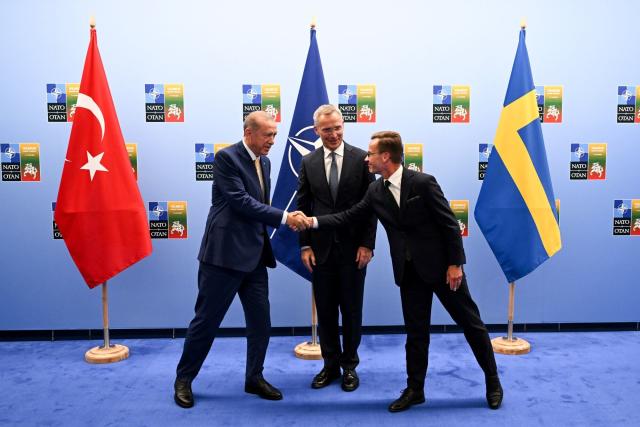In a surprising turn of events, Turkey's President Recep Tayyip Erdogan has recently dropped his objections to Sweden's bid to join the North Atlantic Treaty Organization (NATO). This unexpected shift in stance has sparked a flurry of speculation and analysis among international observers. To understand the significance of this development, it's crucial to delve into the context and the factors that have led to this change.
NATO, a political and military alliance of 30 North American and European countries, has been a cornerstone of international security since its inception in 1949. Sweden's bid to join this alliance has been a contentious issue, primarily due to Turkey's opposition. Erdogan's administration had been the primary stumbling block, accusing Sweden of harboring dissidents whom Turkey considers terrorists, and vowing to let the country join NATO only after it cracked down on them.
However, Erdogan's recent about-face on this issue signals a significant shift in Turkey's foreign policy. This change appears to be driven by a complex interplay of international and domestic factors.
Internationally, the escalating tensions between Russia and the West have put Turkey in a delicate position. As a country that has been trying to maintain a balance between its Western allies and Russia, the increasing geopolitical strains have made this balancing act increasingly difficult. By supporting Sweden's NATO bid, Erdogan may be signaling a strategic shift towards the West, a move that could potentially strain Turkey's relations with Russia.
Domestically, Erdogan's decision comes in the wake of a fiercely contested election in which he secured another term in office. Despite his victory, the strong challenge from his main opponent has highlighted the growing discontent among sections of the Turkish population. By shifting his stance on Sweden's NATO bid, Erdogan may be attempting to project a more cooperative and conciliatory image on the international stage, which could potentially bolster his domestic standing.
Intriguingly, Erdogan's shift on Sweden's NATO bid has coincided with renewed discussions around Turkey's long-stalled bid to join the European Union (EU). By aligning more closely with Western alliances, Erdogan may be hoping to rekindle Turkey's EU aspirations. However, whether these recent policy shifts will overcome the longstanding obstacles to Turkey's EU membership remains to be seen.
Moreover, Turkey's economy, teetering under the pressures of runaway inflation, heavy debt, and recovery costs from devastating earthquakes, could benefit from improved relations with the West. Western nations could provide economic support and investment to help stabilize Turkey's economy, a factor that likely weighed on Erdogan's decision.
In conclusion, Erdogan's sudden shift on Sweden's NATO bid is a complex maneuver driven by a mix of international and domestic pressures. It reflects the intricate and often unpredictable nature of international politics, where alliances and positions can shift in response to changing geopolitical landscapes and domestic realities. As the implications of this decision unfold, it will be interesting to see how it shapes Turkey's relations with its NATO allies, Russia, and its domestic political landscape.










Trackbacks and Pingbacks